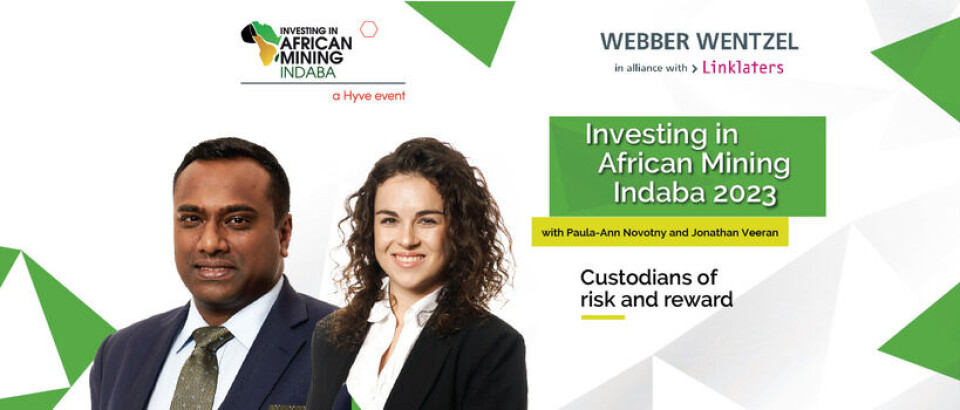As the world grapples with significant, converging challenges, the mining sector is ideally placed to assist in the pursuit of sustainability because it’s one of the biggest and most important industries that can influence and achieve the global agenda of decreasing poverty and seeking sustainable development in unity, say Jonathan Veeran and Paula-Ann Novotny of leading African law firm Webber Wentzel.
“Because of where mining businesses are located, and the sub-sectors and the value chains that they support and rely on, and considering the intrinsically connected operating factors that underpin the foundations of ESG, mining is well placed to set the tone for addressing the developmental challenges of the world,” added Novotny, an expert in environmental and sustainability law.
Looking ahead to Mining Indaba, the world’s largest mining investment event, Veeran expects a “big push” on battery minerals as well the “just energy transition” which places people – the human and social impacts – at the centre of decision-making and fostering climate resilient development. The Mining Indaba is also a place where announcements are made about future plans.
At the 2022 Mining Indaba Rohitesh Dhawan, President and CEO of International Council on Mining and Metals, delivered a keynote speech addressing industry commitments to Net Zero and some mines already being powered by 100% renewables.
“These sorts of industry forums are very good from a content perspective, because on a continent-wide basis there’s very rarely an opportunity for governments, business and related parties to have a discussion or discover what’s top of mind on everyone’s agenda,” said Veeran, an expert on regulatory aspects and transaction structuring in resources industries.
From an ESG and sustainability perspective, the Mining Indaba 2023 is likely to be one of the most exciting ones, commented Novotny, given the many international developments from a climate change and biodiversity perspective, how fast policy and regulation is moving, and the many new opportunities that public and private sector participants are starting to recognise.
“Our mining sector is not new to ESG, and has long been operating according to its principles and foundations in maintaining the 'social licence to operate',” she added. “So one of the most interesting things we’re hoping to see is how mining majors and minors have actually integrated ESG into their day-to-day business models and decision-making structures. How they’ve grappled with the tangible, practical aspects of ESG to make them more resilient companies in the future in order to attract the investments needed for projects linked to the just energy transition and carbon neutrality.”
Webber Wentzel’s long history of advising on mining and environmental issues, coupled with its large expert team that’s active in 22 jurisdictions across Africa, has it ideally placed to help clients deal with what experts have termed an era of “emerging and converging risk”.
Along with environmental issues, Veeran points to “two critical issues at the moment” facing the mining industry and the continent: how to ensure communities benefit from mining in a broader, more holistic way, and security of supply and securing the value chain.
Lawyers have traditionally always been the custodians of risk, said Novotny, but understanding the evolution of the risk frameworks affecting business today allows us to also identify the opportunities presented by sustainable and resilient business operations. It’s about creating long-term, shared value.
Mining Indaba will be held in Cape Town from 6 to 9 February 2023.
To join Africa Legal's mailing list please click here

